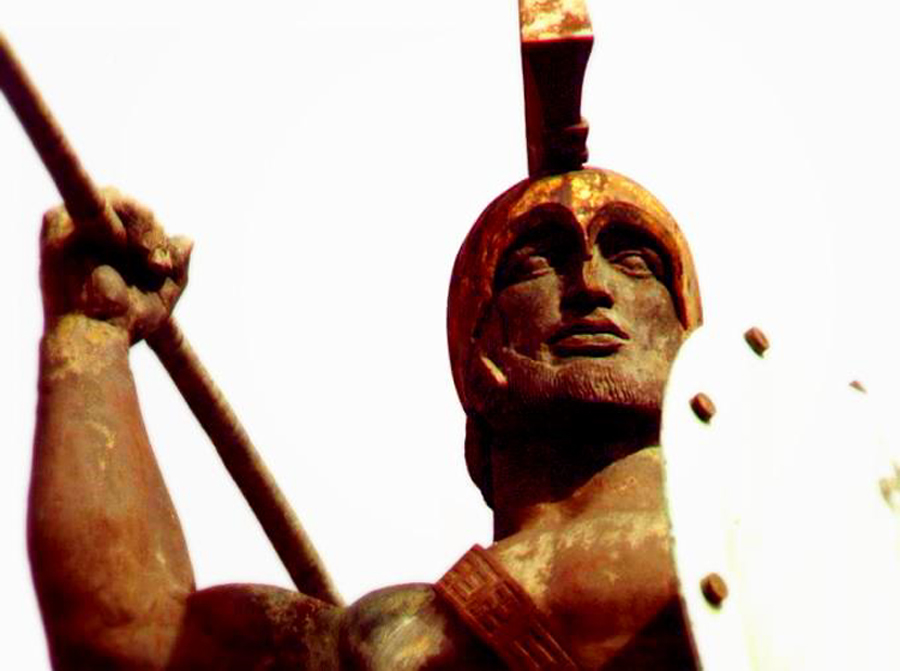





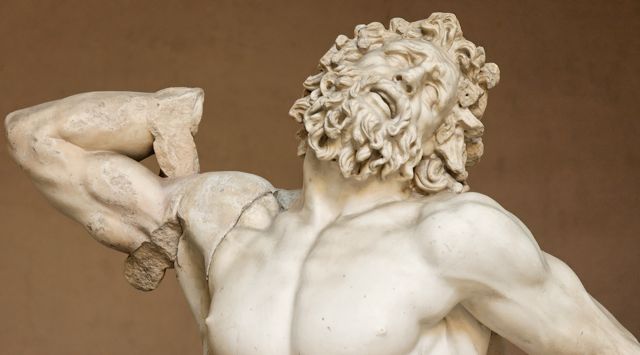


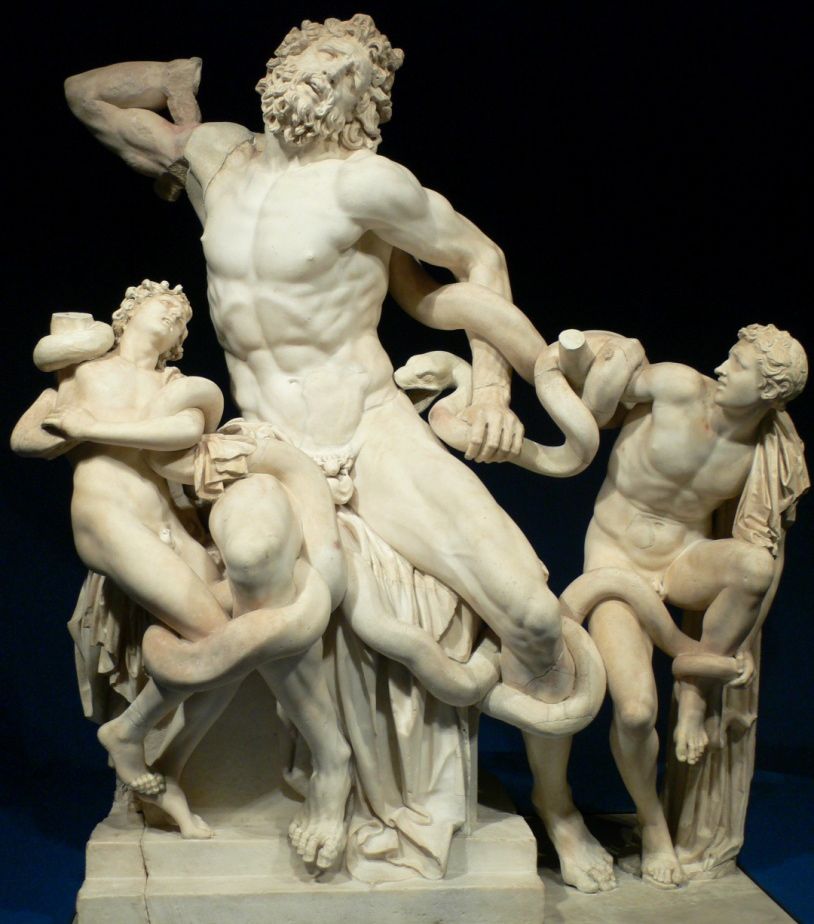







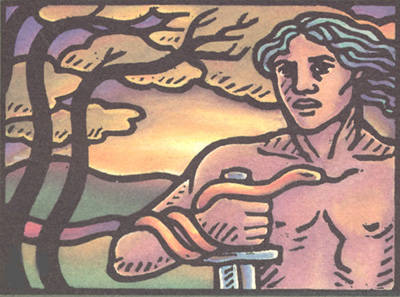


struggling with a lust for other men
9-10-11
Hello
I am a man who is struggling with a lust for other men. I have been trying to find articles on how sodomy is bad for the bottom. There really isn't much out there, because so many homosexuals don't want to face the truth about being anally penetrated. After reading your article about anal, I have found it to be very comforting in knowing that a man who is drawn to another man can be honest about sodomy. You are truly a good and brave man going against the gay establishment. I appreciate your article and consider you a friend.
Dave
Reply from:
Re: struggling with a lust for men
9-12-2011
Hey Dave,
Thank you for writing to me and for your kind words about my work and our sites.
I'm glad they've resonated and been meaningful for you.
Dave, you wrote:
Dave, what you're feeling isn't "lust."
It's sexual desire.
And your sexual desire for another Man, like your desire to be affectionate and loving with another Man, is natural and normal.
Our Man2Man Alliance article, Sex Between Men: An Activity, Not a Condition, will help you understand that.
I hope you'll read it.
Because, as one of our Warrior says, "Male sexual desire for other Men cannot be tied to a minority group; it is rather, a Universal Male Phenomenon, particularly strong among Masculine Men."
Okay.
Yes and No.
There's a lot of scientific research, all peer-reviewed and not disputed, which demonstrates and documents that anal penetration is the leading vector for HIV infection:
http://www.man2manalliance.org/crw/warriorspeak/timeline.html
; and there's a lot of other medical literature, much of which predates AIDS, which details the other medical complications caused by anal penetration:
http://www.man2manalliance.org/crw/defcomplications.html
So -- it's well understood that anal penetration carries massive health risks.
What isn't discussed, nowadays, are the psychological and spiritual consequences of anal.
But that was much discussed in the ancient world -- and thence forward in Western history.
Question:
In the long history of Western civilization, has anal ever been treated as normative?
Answer:
NO.
The Hebrews and the Greeks are the pillars of Western Civ.
"Thou shall not lie with a man as with a woman; it is abomination."
That admonition occurs twice in the Hebrew Bible -- what Christians call the Old Testament.
And most rabbis agree that it refers specifically to anal penetration.
Such admonitions are actually more common in Greek literature.
For example:
In Xenophon's Memorabilia of his friend Sokrates, Sokrates relates a parable told by the sophist Prodicus of "Herakles at the Crossroads of Virtue and Vice," in which Virtue chastises Vice, saying
Then there's the Aesop's Fable known as "Zeus and Shame":
Aesop's Fables, translated by Laura Gibbs (2002)
528. ZEUS AND SHAME
Perry 109 (Chambry 118 *)
After he had created people, Zeus immediately implanted in them all the possible human character traits, but he forgot about Shame. Since he didn't know how to get Shame inside the human body, he ordered her to go in from behind. At first Shame protested, considering Zeus's request to be beneath her dignity. When Zeus kept insisting, she said, 'All right, I will go in there, on the condition that if anything comes in there after me, I will leave immediately.' As a result, people who engage in sodomy have no sense of shame.
Here's a link to the text in Greek.
Shame, by the way, was extremely important to the Greeks.
Someone who was shameless, and the idea of shamelessness, was a horror to them.
As we can see in this next excerpt, which is from Plato's Gorgias, one of the most important books by one of the most important thinkers in the history of both the West and the world.
In this excerpt, Sokrates is in heated debate with a hedonist and amoralist named Callicles, and this is the pivotal moment in that debate:
Socrates. Come now, let me tell you another parable:
Consider if each of the two lives, the temperate and the licentious, might be described by imagining that each of the two men had a number of jars; the one man has his jars sound and full, one of wine, another of honey, and a third of milk, besides others filled with other things, and the sources which fill them are scanty and difficult, and he can only obtain them with a great deal of hard toil. Well, one man, when he has taken his fill, neither draws any more nor troubles himself a jot, but remains at ease on that score. The other, in like manner, can procure sources, though not without difficulty; but his vessels are leaky and unsound, and night and day he is compelled to fill them constantly, and if he pauses for a moment, he is in an agony of extreme distress. If such is the nature of each of the two lives, do you say that the licentious man has a happier one than the orderly? Do I not convince you that the opposite is the truth?
Callicles. You do not convince me, Socrates, for the one who has filled himself has no longer any pleasure left; and this, as I was just now saying, is the life of a stone: he has neither joy nor sorrow after he is once filled; but a pleasant life consists rather in the largest possible amount of inflow.
Soc. Well then, if the the inflow be large, must not that which runs away be of large amount also, and the holes for such outflow be of great size?
Cal. Certainly.
Soc. The life which you are now depicting is not that of a dead man,
or of a stone, but of a plover [a bird thought to drink and then to eject the liquid]; you mean that he is to be hungering and eating?
Cal. Yes.
Soc. And he is to be thirsting and drinking?
Cal. Yes, that is what I mean; he is to have all his desires about
him, and to be able to live happily in the gratification of them.
Soc. Capital, excellent; go on as you have begun, and have no shame; I, too, must disencumber myself of shame: and first, will you tell me whether you include itching and scratching, provided you have enough of them and pass your life in scratching, in your notion of happiness?
Cal. What a strange being you are, Socrates! a regular stump-orator.
Soc. That was the reason, Callicles, why I scared Polus and Gorgias,
until they were too modest to say what they thought; but you will
not be too modest and will not be scared, for you are such a manly fellow. And now, answer my question.
Cal. I answer, that even the scratcher would live pleasantly.
Soc. And if pleasantly, then also happily?
Cal. To be sure.
Soc. But what if the itching is not confined to the head? Shall I
pursue the question? And here, Callicles, I would have you consider
how you would reply if consequences are pressed upon you, especially
if in the last resort you are asked, whether the life of a catamite is
not terrible, shameful, and wretched? Or would you venture to say, that they too are happy, if they only get enough of what they want?
Cal. Are you not ashamed, Socrates, of introducing such topics
into the argument?
Soc. Well, my fine friend, but am I the introducer of these
topics, or he who says without any qualification that all who feel
pleasure in whatever manner are happy, and who admits of no
distinction between good and bad pleasures? And I would still ask,
whether you say that pleasure and good are the same, or whether
there is some pleasure which is not a good?
Sokrates asks, "Is there some pleasure which is not a good?"
And he then asks:
And the word "catamite" in the original Greek is kinaidos, that is, a male who's anally passive, and/or who participates in anal penetration.
Someone who's lewd and shameless.
And the link I've provided will take you to the passage in both English and Greek -- if you read Greek.
If you don't, find someone who does and check out the meaning of kinaidos.
These are not, it must be emphasized, incidental or minor works in the Western canon.
They're important -- to put it mildly.
Let's go back to "Herakles at the Crossroads of Virtue and Vice."
In the parable, both Virtue and Vice are personified.
The Greek word for Vice is "kakia," which derives from the Greek word "kake," meaning human waste, fecal material, shit.
The Greek word for Virtue is "areté," meaning manly excellence -- here's a more extended discussion of "areté" -- and it derives from the Greek word Ares -- the Greek God of War.
This could not be plainer.
Vice derives from kake, human waste, which comes from the anus.
Virtue derives from Ares, the God of War -- and of Manhood.
Warrior Manhood.
As the ancient Greek lexicon says -- Virtue is
Vir-tus -- meaning originally martial courage -- from Vir -- Man.
So, and again, there's a core dichotomy:
Anus -- and anal -- are vice.
Manhood, which physically, of course, is Phallus, is Virtuous.
Dave:
Okay.
Again, as you'll understand when you read Sex Between Men: An Activity, Not a Condition, in the Alliance, we no longer use terms like "homosexual" or "gay";
instead we say gay-identified, straight-identified, etc.
Again, Sex Between Men: An Activity, Not a Condition, will explain why.
That's correct.
Their culture, which we call analism, doesn't allow them to face that truth.
Good!
Thank you Dave.
And please be clear, Dave, it's not just me.
We have many posts on the site, from other guys, also opposing that establishment's embrace of sodomy.
Unfortunately, most of those guys aren't willing to use their real names.
But here's one who is:
Dave, thank you again.
Bill Weintraub
Guys --
I wanted to post Dave's letter because it's typical of the sort I so often receive from guys who are confused about male-male --
a confusion which is fostered by our heterosexualized society's demand that all identify as either "gay" or "straight."
And by analism's demand that all who identify as "gay" -- be anally penetrated.
Whether they want to be or not.
It's easy for most of you to see -- hopefully -- that that second demand -- to bend over -- is wrong and unfair.
But what about the first demand -- which posits that the labels and categories of sexual orientation are somehow eternal and immutable?
That would have been news to the Men of the ancient world -- who simply assumed that ALL MEN would be attracted to both Men and Women.
So -- in my reply to Dave, I spoke of the universal condemnation of anal among the Hebrews and Greeks.
That's one side of the male-male coin in the ancient world -- the condemnation of anal.
The other side of that Man2Man coin -- is the Celebration and Exaltation of Manly Love.
And once again, there are more references among the Greeks to such celebration.
The Hebrews of course have the story of David and Jonathan.
But the Greeks had many tales of Warrior-Lovers, Warrior-Lovers who were Gods, mythical Heroes, and real-life Heroes.
And in each instance, the Men involved were either married to Women, or had female lovers as well as male lovers.
Zeus, King of the Gods and by far the most important Greek God, had both a wife, Hera, and a Male Lover, Ganymedes.
Zeus' Love of Ganymedes was in no way hidden, nor was it considered shameful.
Zeus' brother and fellow God Poseidon
was the Lover of the Hero Pelops, who gave his name to the Peloponesse -- "Pelops' Island" -- which is where Sparta, among other city-states, was located.
The great Greek poet Pindar immortalized their Love in his "First Olympian Victory Ode," saying
Both Pelops and Poseidon were married to Women.
Indeed, in the First Olympian, Pindar tells the tale, known to all Greeks, of how Poseidon helped his beloved Pelops win a chariot race and thus a bride.
Then there was Apollo, another very important Greek God.
His Male Lover was the Spartan prince Hyakinthos.
And Apollo, though he wasn't married, had liaisons with many Women.
Then there was Herakles -- a son of Zeus who was deified.
His Male Lover was Iolaos.
His Wife was Hebe.
Many mythical Heroes had Male Lovers as well -- the most important being Achilles and Patroklos.
Achilles, the greatest Warrior of the Trojan War, was married and had a son -- Neoptolemus.
While in the Iliad both Achilles and Patroklos are sexually involved with Women who are not their wives, but who are basically slaves.
Among "real" people -- neither Gods nor Mythic Heroes, but actual guys -- the most famous were Harmodius and Aristogeiton, Athenian Lovers who, by killing the brother of the reigning and very pro-Persian tyrant, launched the struggle for Athenian democracy.
Thucydides, the great historian of the Peloponessian War, tells their story, as do many Greek authors.
This is part of what Thucydides says:
~translated by Dent
You'll notice that Thucydides says of Harmodius that Aristogeiton "was his lover and possessed him."
The translation is old -- 1910.
The Greek word translated as "possessed" means, more simply, "held."
And while the word can certainly mean "possess," it can also mean "to hold fast" -- as the Greek lexicon explains:
And I suspect that's what Thucydides means -- that Aristogeiton held Harmodius.
In a physical and thus sexual sense.
Interesting that Thucydides uses a word to characterize Male Lovers that can also apply to Wrestlers -- isn't it?
In any case, that sense of the word would make the language closer to some of that in Plato's Phaedrus, written not that long thereafter.
Harmodius was the younger of the two -- in this vase painting, he's on the right --
and I don't know if he was married.
But Aristogeiton was, and we know he had children and grandchildren.
How do we know that?
Because Plutarch, another Greek philosopher and historian, mentions, just in passing, Aristogeiton's granddaughter in his biography of the Athenian statesman Aristides, known as Aristides the Just:
~translated by Perrin
And Harmodius and Aristogeiton are just one among many real-world male-male couples who we know about in the ancient world.
Again, male-male was not simply common, but virtually universal.
And acknowledged to be.
Compare and contrast that, if you will, to this recent headline in the NY Times:
The gist of the article is that whereas for some years, researchers claimed they could find no evidence of "true" "bisexuality" among males, and therefore asserted that all males were either "gay, straight, or lying" --
NOW -- researchers claim they have, using rather crude methods, found evidence of at least a few "bisexual" males.
And really, although the Times' piece is somewhat slanted in favor of "bisexual advocates," there's nothing good I can say about the article, which masquerades as enlightened because it acknowledges the existence of "bisexual men," while relegating them to a teensy-weensy minority within the "LGBT" community.
It's a truly bizarre disconnect, and obviously cultural -- except the Times refuses to see it that way -- between our world and the ancient world.
Yet there's no way around it:
Either the texts and artwork on which we rely for not just information about the ancient world -- but which are foundational in many fields of human endeavour in the West --
not the least being philosophy, science, and virtually all other forms of rational thought and behavior --
including, according to classicist Victor Davis Hanson, "constitutional government, civil liberties, free exchange of ideas, self-critique, private property, capitalism, and separation between religious and political/scientific thought --
either those texts and that art is ALL fraudulent --
or our view of human sexuality, which comes out of centuries of Christian repression -- is deeply flawed.
Obviously, it's the latter.
Think about it for a moment.
I've just shown you a lot of art -- and some text.
I could have shown you a lot lot lot lot more.
So what you do you think?
Is it all fraudulent?
Is this a fraud, some sort of bizarre con being executed by people of the past on us of the present?
Doesn't seem likely, does it?
What's interesting is that contemporary classicists, even though they are contemporary and partake of contemporary society's prejudice against "bisexuality," don't hesitate, in their written work, to describe ancient Men -- as "bisexual."
For example, the authoritative Oxford Classical Dictionary, not exactly a radical publication, in its entry titled "Greece (prehistory and history)," says this of the period from 776 to 479 BC:
The writer leaves out nudity in athletics, which appears to have been instituted about the same time as the Olympian games themselves.
But the Greeks considered nudity in certain circumstances, particularly athletics, as the mark of the civilized man.
As they did male-male affection, intimacy, sex, and Love.
Indeed, they thought both were characteristic of not just the civilized, but the *free* man.
Now, and of course, the writer says "homosexuality," but he doesn't really mean "homosexuality" in our contemporary sense of an exclusive male erotic interest in other males --
what he really means is "bisexuality" and a society which we would call "bisexual," a society in which Men did not consider male-male "relations" in any way incompatible, as classicist KJ Dover says, with male-female "relations" or male-female marriage.
They thought that a Man should have both -- a male-female marriage, and a male-male relationship.
That comes out a bit more clearly in this passage from Nick Sekunda's The Spartan Army, part of the Osprey Elite Series -- about which you can learn more on our Heroes Reading List:
Now, and first off, though we can smile at anachronistic -- not to say downright silly -- phrases like "practising homosexuals" -- we need to be clear that Sekunda's book is, as a whole, respected.
Indeed, no less a luminary than U Virginia classicist J E Lendon recommends Sekunda's book over weightier tomes by scholars like Lazenby.
Lendon feels that Sekunda's description of the way the Spartans organized their forces over the years is more factual than that of others.
Does that mean that Sekunda's paragraph about Spartan male-male is correct?
Well, about all he's doing is paraphrasing and then stringing together some lines from Plutarch and Xenophon, and in that sense, Yeah, he's more or less on target.
Even though he omits some important stuff, like Lover Fighting at the side of his Beloved in the Spartan line.
And, like a lot of folks, he overemphasizes pederasty and "boys."
For example:
How old was Harmodius?
In the statuary and vase paintings, he's certainly not a "boy"; he appears rather to be in late adolescence:
Dent, translating in 1910, says that he was the "in the flower of youthful beauty."
Rex Warner, translating in 1954 -- and by the way, Warner's introduction to the Penguin edition of Thucydides is BRILLIANT -- well worth the few pennies you'd pay for it used --
Warner describes Harmodius as
[emphasis mine]
And this is not uncommon in these sorts of descriptions of handsome young males.
For example, in Plutarch's Life of the Spartan King Agesilaus, he says this of a Spartan Warrior who went into battle naked:
~translated by Perrin
"He was of conspicuous beauty and stature, and at an age when the human flower has the greatest charm, as the boy merges into the man"
How old, then, was he?
Well, he had to be at least eighteen -- to be "of Fighting age."
And given that puberty would have come later in ancient Greece than it does for us -- that makes sense.
The boy would be merging into the Man at about the age of eighteen.
And obviously, in a culture like that of ancient Greece, other Men would have found him attractive.
So, in my view, and though I well understand where Sekunda is coming from, there's an overemphasis on "boy" which does not match the pictorial -- and much of the literary -- evidence.
Nevertheless, what Sekunda says here is correct -- sort of: "Bisexuality . . . was quite widespread in many ancient Greek states."
I say "sort of" because, and again, according to the Oxford Classical Dictionary, which is basically the last word in these matters, "bisexuality" was one of the four hallmarks of Greek civilization:
And it should be noted that all four involved male nudity:
Guys competed nude, they trained nude, they were frequently nude at the all-male messes or dinner parties, and of course, they didn't keep their clothes on for sex -- either.
Plus they often went to war nude.
And that's just how it was.
And that's why Richard Horton, editor of the prestigious UK medical journal The Lancet, says, in his critique of the "search for a 'gay' gene," that
Horton:
"There are no convincing historical grounds" for the view "of the homosexual as a physical 'species' different from the heterosexual."
No convincing historical grounds.
No means NONE.
Not any.
Don't exist.
And if the "homosexual as a physical 'species' different from the heterosexual" doesn't exist --
which it does NOT --
then it's not "gay, straight, or lying."
It is, rather, those who claim to be exclusively "gay" or "straight" -- who are LYING.
To themselves, and to everyone else.
While the impetus for that lying is, in fact, coming from the dominant, heterosexualized culture, and its two "isms" -- analism and heterosexism.
Horton quotes historian Jonathan Ned Katz:
Horton, it should be said, doesn't agree with Katz.
But to me, what Katz is saying is inescapable:
If "the heterosexual/homosexual binary is not in nature" --
which it's not --
then it's socially constructed.
And if it's socially constructed -- which it is --
it can -- and inevitably will be -- deconstructed.
Given what Horton says about "no convincing historical evidence" for homosexual/heterosexual --
and given what we know about ancient Greek -- and Roman and Celtic -- male-male and male-female --
I don't see how you -- or the Academy -- can reach any other conclusion.
And that's what's happening.
For example, Professor Joan Roughgarden of Stanford University as quoted in Scientific American in 2008:
"exclusive homosexuality is not accurate of people"
That's correct.
Which means that Prof Sekunda's description of "a large percentage of the adult male population [as] practising homosexuals" -- isn't just silly -- it's incorrect.
These were guys who, like King Agesilaos, were married -- and had Male Lovers.
We could, I guess, say that a large percentage of the adult male population were "practising bisexuals" --
but that's even sillier, isn't it?
And terribly anachronistic.
Spartan Men did NOT think of themselves as "bisexuals."
They thought of themselves as MEN.
Spartan Men, to be sure -- but MEN.
Men like other Greek Men -- who trained and competed in athletics nude, who went to war nude, who attended all-male messes -- and who had both wives and male lovers.
That's the Greek reality.
And there's no escaping it.
Just as there's no escaping the Heroism and Brilliance of the Society created by these Men who Loved both Women -- and Men:
This early marble bust, which was found on the Spartan acropolis, is often associated with Leonidas, the heroic Spartan king who courageously chose to die, with 299 of his royal guard, at Thermopylae in 480. In fact, while the sculpture may represent another early Spartan hero or god, the stern expression of resolve, elegant though simple headgear, and muscular physique magnificently capture the Spartan ideal.
~Victor Davis Hanson
So guys --
I never heard back from Dave.
Who, he said, was "struggling with a lust for other men."
I suspect that Dave didn't much care for the idea that Sex between Men might be an Act -- rather than a condition.
And that his "lust" -- is just plain old garden-variety sexual desire.
I suspect that he prefers -- is more comfortable with -- the idea of "lust" and "struggling with a lust for other men."
And yet --
Can you imagine an ancient Greek saying that?
The correct answer is -- NO.
A Man didn't "struggle" with his sexual desire for another male.
Greek Men -- as I've said in recent posts and will keep saying -- were supposed to be the masters, not the slaves, of their passions.
In that sense, a Man might require of himself that he put his sexual desire for one or another other male -- behind him.
But he wouldn't have struggled against, in a generic sense, his sexual desire for other Men.
There was no need to.
Such desire had to be expressed appropriately -- and there were all sorts of rules as to what was appropriate.
But the desire itself -- was just part of Male Life.
Indeed, it was just part of Life -- period.
That's why Thucydides, who by general consent is the greatest historian the world has ever known -- Rex Warner describes him as "incomparable," and that's correct --
That's why Thucydides begins his account of Harmodius and Aristogeiton with these words:
He doesn't, you'll notice, say a "homosexual" love affair, or a "gay" love affair, or a "bisexual" love affair -- or anything else.
He says "a love affair."
And that's all he needs to say.
Harmodius and Aristogeiton were Lovers.
Hipparchus tried to come between them -- he was, or wanted to be, an interloper in their love affair.
That wasn't acceptable, it wasn't allowed.
But because he was very powerful, and because he had the potential, therefore, to "take Harmodius by force" -- that is, rape Harmodius -- Harmodius and Aristogeiton couldn't just ignore him.
So they killed him.
But -- the blood and gore should NOT divert your attention from this plain fact --
that Thucydides says it was "a love affair" -- with NO modifiers -- which drove the drama.
So -- love affairs -- "between Men," we would say, but the Greeks wouldn't -- were just part of life.
Part of Male Life.
Part of Life -- period.
As they still are.
But that's a story which, for our generation, has yet to be told.
If you guys would help out -- just a tiny little bit -- it would get told more quickly.
But you won't --
so it won't --
either.
Bill Weintraub
September 12, 2011
© All material Copyright 2011 by Bill Weintraub. All rights reserved.
Reply from:
Re: struggling with a lust for other men
9-12-2011
Hi Warrior Bill,
As you know I struggled for years with what I thought of as LUST for men, and what I did and wanted to do was lustful and self destructive, that is anal.
Now though I know better that which I want is that which I wish to share with another MAN and share with him because of our LOVE.
Lust destroys, being born out of greed and selfishness. Love strengthens, and makes a worthy relationship happen. That is why when two people (whether man and man, or man and woman, or woman and woman) bring their bodies together they can be said to be making LOVE.
So to Dave, or any man I would say stop struggling against your manly nature. Instead make it part of your life, as it should always have been. I have done that and, IT FEELS GREAT!
With Warrior Love,
Brian
and AND
Warriors Speak is presented by The Man2Man Alliance, an organization of men into
Frot
To learn more about Frot, ck out What's Hot About Frot
Or visit our FAQs page.
© All material on this site Copyright 2001 - 2011 by Bill Weintraub. All rights reserved.
It was my own innate understanding of the essentially Combative and Aggressive nature of Men, and my own instinctual relating of that to the testicles, which produced those fantasies and gave them so much power in my life.
In this Dialogue, written in the first century AD by Lucian but presenting an imagined conversation between the *sixth century BC* Athenian lawgiver Solon and a Scythian visitor to Athens named Anacharsis, we get some idea of what that training was like -- starting with Athenian kids, and then progressing to Spartan youth:
Anacharsis: And another thing, my dear Solon, why are those young men
acting in this way? Look, some of them are grappling and tripping each
other, others are choking their friends and twisting their limbs, rolling about in the mud and wallowing like pigs. But before they began to do this, I noticed they first took off their clothes, then put oil on themselves, and in a peaceful fashion took turns in rubbing each other. But now, experiencing some emotion I do not understand, they have lowered their heads and are crashing into each other, and butting their heads together like rams! And look! There is one who has just seized the other by the legs and thrown him down; then he flopped on him and did not allow him to get up, but shoved him down into the mud. And now he is finally twisting his legs around the other person's waist and choking him with his arm under his throat. The other is slapping him on the shoulder, trying to ask him, I suppose, not to choke him to death. They do not avoid getting covered with dirt even to save the oil, but on the contrary wipe it off, and smearing themselves with mud and rivers of perspiration they make themselves ridiculous, in my opinion, by sliding in and out of each other's hands like eels.
Others are acting in the same way in the open part of the courtyard.
However, these are not in the mud, but they have this deep sand in the pit which they sprinkle on themselves and each other, just like roosters, so that they cannot break out of their grasp, I imagine, since the sand decreases the slipperiness and offers a surer grip on a dry skin.
Others also covered with dust are standing up straight and striking and
kicking each other. See that one there! Poor fellow, he seems to be ready to spit out a mouthful of teeth considering how full of blood and sand his mouth is; he has got a blow to the jaw, as you can see for yourself. But the official there does not separate them and stop the fight -- at least I assume he is an official from his scarlet cloak. On the contrary he encourages them and cheers the one who struck that blow.
All around different people are all exercising: some raise their knees as if running, although they remain in the same place, and as they jump up they kick the air.
What I want to know is, what reason do they have for doing this? It seems to me these actions are almost insane, and there is no one who can easily persuade me that people who act like this have not lost all their senses.
[Solon explains that customs differ from one land to another. He then explains to Anacharsis what is happening.]
Solon: This place, dear Anacharsis, is what we call a gymnasion and it and is sacred to Lykeian Apollo. You can see his statue, leaning against a stele, holding his bow in his left hand. His right arm is bent above his head as if the artist were showing the God resting, as if he had completed some laborious task. As for those exercises in the nude, the one done in the mud is called wrestling. Those in the dust are also wrestling. Those who strike each other standing upright we call pankratiasts. We have other athletic events: we have contests in boxing, diskos, and the long jump, and the winner is considered superior to his fellows and takes the prize.
Anacharsis: These prizes of yours now; what are they?
Solon: At Olympia there is a crown of wild olive; at Isthmia, one of pine; at Nemea, one woven of celery; at the Pythian Games, laurel berries sacred to the god, and here at home at the Panathenaic Games, oil from olive trees which grow in the sacred precincts. What are you laughing at, Anacharsis? Do these prizes seem valueless to you?
[Solon explains the symbolic value of the prizes, justifies the pursuit of athletics, the education of the citizens. Then Anacharsis asks Solon to explain the government of Athens.]
Solon: It is not easy, my friend, to explain everything at once in concise form, but if you will take one thing at a time you will learn everything about our belief in the gods, as well as our attitude toward parents, marriage, or anything else.
I will now explain our theory about young men and how we treat them from the time when they begin to know the difference between right and wrong and are entering manhood and sustaining hardships, so that you may learn why we require them to undergo these exercises and force them to subject their bodies to toil, not just because of the athletic games and the prizes they may win there, for few of them have the ability to do that, but so that they may try to gain a greater good for the entire city and for themselves. For there is another contest set up for all good citizens and the crown is not made of pine nor of wild olive nor of celery, but is one which includes all of man's happiness, that is to say, freedom for each person individually and for the state in general: wealth, glory, pleasure in our traditional feast days, having the entire family safe from harm, and in a word, to have the best of all the blessings one could have from the gods.
All this happiness is woven into the crown to which I referred and is acquired in the contest to which these exhausting exercises lead.
[Solon goes into more detail about the training of young men and about the responsibility of the citizens.]
Solon: As for physical training, which you particularly wanted to hear about, we proceed as follows. When the boys reach an age when they are no longer soft and uncoordinated, we strip them naked. We do this because first, we think they should get used to the weather, learning to live with different seasons, so they are not bothered by the heat nor do they yield to the cold. Then we massage them with olive oil and condition the skin. For since we see that leather which is softened by olive oil does not easily crack and is much stronger, even though it is not alive, why should we not think that live bodies would benefit from oil? Next we have thought up different kinds of athletics and have appointed coaches for each type. We teach one how to box, another how to compete in the pankration, so that they can become used to hard work, to stand up to blows face to face, and not to yield through fear of injury.
This creates two valuable traits in our young men: it makes them brave in the face of danger and unsparing of their bodies, and it also makes them strong and vigorous. Those who wrestle and push against each other learn how to fall safely and spring up nimbly, to endure pushing, grappling, twisting, and choking, and to be able to lift their opponent off the ground. They are not learning useless skills but they get the one thing which is the first and most important thing in life: through this training their bodies become stronger and capable of enduring pain. There is another thing too which is not unimportant. From this training they acquire skills which they may need some day in war. For it is clear that if a man so trained grapples with an enemy, he will trip and throw him more quickly and if he is thrown he will know how to regain his feet as easily as possible. For we prepare our men, Anacharsis, for the supreme contest, war, and we expect to have much better soldiers out of young men who have had this training, that is, the previous conditioning and training of naked bodies, which makes them not only stronger and healthier, more agile and fit, but also causes them to outweigh their opponents.
You can see, I should think, the results of this, what they are like when armed, or even without weapons how they would strike terror in their enemies. Our troops are not fat, pale, and useless nor are they white and scrawny ... enervated by lying in the shade, simultaneously shivering and streaming with rivers of sweat, gasping beneath their helmets, particularly if the sun, as now, is burning with noontime heat. What use could people be who get thirsty and cannot endure dust; soldiers who panic if they see blood, who die of terror before they come close enough to throw their spears or to close with the enemy? But our troops have skin of high color, darkened by the sun, and faces like real men; they display great vigor, fire, and virility. They glow with good health, and are neither shriveled skeletons nor excessively heavy, but they have been carved to perfect symmetry; they have used up and sweated off useless and excess flesh, and that which is left is strong, supple, and free, and they vigorously keep this healthy condition. For just as the winnowers do with wheat, so our athletes do with their bodies, removing the chaff and the husks and leaving the grain in a clean pile.
Through training like this a man can't avoid being healthy and can stand up indefinitely under stress. Such a man would sweat only after some time, and he would seldom be seen to be ill. Suppose someone were to take two torches and throw one into the grain and the other into the straw and chaff -- you see, I am returning to the figure of the winnower. The straw, I think, would burst into flames much more quickly, but the grain would burn slowly with no large flames blazing up nor would it burn all at once, but it would smoulder slowly and eventually it too would be burned.
Neither disease nor fatigue could easily attack and overcome such a body or easily defeat it. For it has good inner resources which defend it against attacks from outside, so as not to let them in, neither does it admit the sun or the cold to its hurt. To avoid yielding to hardships, great vigor springs up within, something prepared long in advance and held in reserve for time of need. This vigor fills up at once and waters the body in a crisis and makes it strong for a long time. For the previous training in bearing strain and hardship does not weaken their strength but increases it, and when you fan it the fire burns stronger.
We train them to run, getting them to endure long distances as well as
speeding them up for swiftness in the sprints. This running is not done on a firm springy surface but in deep sand, where it is not easy to place one's foot forcefully and not to push off from it, since the foot slips against the yielding sand. We train them to jump over ditches, if they have to, or any other obstacles, and in addition we train them to do this even when they carry lead weights as large as they can hold. They also compete in the javelin throw for distance. In the gymnasium you also saw another athletic implement, bronze, circular, like a tiny shield with no bar or straps. You handled it as it lay there and expressed the view that it was heavy and hard to hold on to because it was so smooth. Well, they throw this up in the air both high and out, competing to see who can throw the longest and pass beyond the others. This exercise strengthens the shoulders and builds up the arms and legs.
As for this mud and dust, which originally seemed so amusing to you, my
friend, listen while I tell you why it is used. First, their fall will not be on unyielding dirt but they will fall safely on soft ground. Next, their slipperiness has to be greater when they sweat in the mud. You likened them to eels, but the facts are neither useless nor humorous: it adds not a little to strength of the sinews when they are forced to hold firmly to people in this condition when they are trying to slip away. Do not think it is easy to pick up a sweaty man in the mud, covered with oil and trying to get out of your arms. All these skills, as I said earlier, are useful in combat, if it were necessary to pick up a wounded friend and carry him easily to safety or to seize an enemy and bring him back in your arms. And for this reason we train them beyond what is necessary, so that when they have practiced hard tasks they may do smaller ones with much greater facility.
We believe the dust is used for the opposite reason than the oil is, that is, so that a competitor may not slip out of his opponent's grasp. For after they have been trained in the mud to hold fast to something which is escaping from them because of its slipperiness, they then practice escaping out of the arms of their opponent, no matter how impossibly firm they may be held. Furthermore when this dust is used liberally it checks the perspiration and makes their strength last longer and furnishes protection against harm from drafts which otherwise attack the body when the pores are open. Besides, the dust rubs off the accumulation of dirt and makes the skin gleam.
I should dearly like to stand one of those white-skinned fellows who live in the shade beside one of our boys who work out in the Lykeion, and after I had washed off the dust and the mud, ask you which one you would like to resemble. For I know that you would choose at first glance, without hesitation, even without putting either through any tests, the one which is solid and hard rather than soft, weak, and pale, because what little blood he has has been withdrawn into the interior of his body.
[Anacharsis then ridicules the idea that athletic training could be useful in war. Why not save your strength, he asks. Solon explains that strength cannot be saved like a bottle of wine; it must be constantly used.]
Anacharsis: I just don't understand what you said, Solon. It is too intellectual for me and requires a sharp mind and keen insight. But above all, tell me this, why, in the Olympic Games and at Isthmia and Delphi and elsewhere, where so many competitors, you say, assemble to see these young men compete, you never have a contest with weapons but you bring them before the spectators all naked and exhibit them getting kicked and punched, and then, if they have won, give them berries and wild olives? It would be worth knowing why you do this.
Solon: My dear Anacharsis, we do this because we think that their enthusiasm for athletics will increase if they see that those who excel at them are honored and are presented to crowds of Greeks by heralds. Because they are to appear stripped before so many people, they try to get into good condition, so that when they are naked they will not be ashamed, and each one works to make himself capable of winning. As for the prizes, as I said earlier, they are not insignificant: to be praised by the spectators, to be a recognized celebrity, and to be pointed out as the best of one's group. As a result of these prizes, many of the spectators who are of the right age for competition go away completely in love with courage and struggle. If someone should remove love of glory from our lives, what good would we ever achieve, Anacharsis, or who would strive to accomplish some shining deed? But now it is possible for you to imagine from these games what sort of men these would be under arms, fighting for fatherland and children and wives and temples, when they show so much desire for victory in competing for laurel berries and wild olives.
Furthermore, how would you feel if you should observe fights between
quails and between roosters here among us, and see the great interest
which is shown in them? Wouldn't you laugh, particularly if you should learn that we do this in accordance with our laws and all men of military age are instructed to be present and to see these birds fight until they are exhausted? But it is no laughing matter, for eagerness for danger creeps insensibly into their souls so that they try not to seem less courageous and bold than the roosters nor to give in too soon because of injury or fatigue or any other distress.
As for trying them in armed combat and seeing them receive wounds --
never! It is brutal and dreadfully wrong, and in addition it is economically unfeasible to destroy the bravest, whom we could better use against our enemies.
Since you tell me, Anacharsis, that you expect to travel to the rest of
Greece, if you get to Sparta, remember not to laugh at them nor think that they have no purpose when they compete in a theater, rushing together and striking each other, fighting over a ball, or when they go into a place surrounded by water [known as Plantanistas, or Plane-Tree Grove], choose up sides, and fight as if in actual war, although as naked as we Athenians are, until one team drives the other out of the enclosure into the water, the Sons of Herakles beating the Sons of Lykurgos or vice versa; after this contest there is peace and no one would strike another. In particular, do not laugh if you see them being whipped at the altar, streaming with blood, with mothers and fathers standing by, not at all bothered by what is happening but on the contrary threatening them if they do not hold up under the blows, urging them to bear up under the pain as long as possible, and to be strong under this hideous treatment. To tell the truth, many have died in these contests, not thinking it manly to yield before the eyes of their friends and relatives while they are still alive, no, not even to flinch. You will see honors paid to statues of people like this erected at public expense by the state of Sparta.
~ translated by Sweet.
The great Greek philosophers Sokrates and Plato spent a lot of time debating and defeating the hedonists of their day.
Plato wrote three very powerful books detailing that debate, beginning with the Protagoras, continuing in the Gorgias, and culminating in the Republic, one of the most important works of Western literature.
In the Gorgias in particular, Sokrates identifies hedonism with those who in his day, engaged in anal.
And since anal was proscribed -- forbidden -- by the Greeks, he uses that fact to defeat the hedonists.
Here's the debate -- the hot-headed hedonist is a guy named Callicles, and he's debating Sokrates:
Socrates. Come now, let me tell you another parable:
Consider if each of the two lives, the temperate and the licentious, might be described by imagining that each of the two men had a number of jars; the one man has his jars sound and full, one of wine, another of honey, and a third of milk, besides others filled with other things, and the sources which fill them are scanty and difficult, and he can only obtain them with a great deal of hard toil. Well, one man, when he has taken his fill, neither draws any more nor troubles himself a jot, but remains at ease on that score. The other, in like manner, can procure sources, though not without difficulty; but his vessels are leaky and unsound, and night and day he is compelled to fill them constantly, and if he pauses for a moment, he is in an agony of extreme distress. If such is the nature of each of the two lives, do you say that the licentious man has a happier one than the orderly? Do I not convince you that the opposite is the truth?
Callicles. You do not convince me, Socrates, for the one who has filled himself has no longer any pleasure left; and this, as I was just now saying, is the life of a stone: he has neither joy nor sorrow after he is once filled; but a pleasant life consists rather in the largest possible amount of inflow.
Soc. Well then, if the the inflow be large, must not that which runs away be of large amount also, and the holes for such outflow be of great size?
Cal. Certainly.
Soc. The life which you are now depicting is not that of a dead man,
or of a stone, but of a plover [a bird thought to drink and then to eject the liquid]; you mean that he is to be hungering and eating?
Cal. Yes.
Soc. And he is to be thirsting and drinking?
Cal. Yes, that is what I mean; he is to have all his desires about
him, and to be able to live happily in the gratification of them.
Soc. Capital, excellent; go on as you have begun, and have no shame; I, too, must disencumber myself of shame: and first, will you tell me whether you include itching and scratching, provided you have enough of them and pass your life in scratching, in your notion of happiness?
Cal. What a strange being you are, Socrates! a regular stump-orator.
Soc. That was the reason, Callicles, why I scared Polus and Gorgias,
until they were too modest to say what they thought; but you will
not be too modest and will not be scared, for you are such a manly fellow. And now, answer my question.
Cal. I answer, that even the scratcher would live pleasantly.
Soc. And if pleasantly, then also happily?
Cal. To be sure.
Soc. But what if the itching is not confined to the head? Shall I
pursue the question? And here, Callicles, I would have you consider
how you would reply if consequences are pressed upon you, especially
if in the last resort you are asked, whether the life of a catamite is
not terrible, shameful, and wretched? Or would you venture to say, that they too are happy, if they only get enough of what they want?
Cal. Are you not ashamed, Socrates, of introducing such topics
into the argument?
Soc. Well, my fine friend, but am I the introducer of these
topics, or he who says without any qualification that all who feel
pleasure in whatever manner are happy, and who admits of no
distinction between good and bad pleasures? And I would still ask,
whether you say that pleasure and good are the same, or whether
there is some pleasure which is not a good?
~translated by Jowett and Lamb
So: Socrates asks, "Is there some pleasure which is not a good?"
And the word "catamite" in the original Greek is kinaidos, that is, one who is anally passive, and/or who participates in anal penetration.
That is, an analist.
"Is there some pleasure which is not a good?"
Anal.
The life of an analist, says Sokrates, is "terrible, shameful, and wretched."
And Callicles doesn't dare disagree with him.
Because the cultural prohibition against anal is too severe.
I have no question that privately, Callicles thinks anal is okay.
That to his mind, "If it feels 'good,' do it!" and "It's all sex and it's all good!" -- are imperatives.
But he doesn't dare say so -- regarding anal.
Because again, the cultural prohibition against anal is too severe.
As it should be.
In the protection of your Manhood.
In the safeguarding of your Life.
Recently I've been reading John Milton, the great English poet and defender of the Puritan and Parliamentary Revolution.
I've been reading his prose pieces -- which were written to advance that Revolutionary cause.
If you think I'm dogmatic and militant -- you should read Milton.
But his militancy helped bring about the freedoms we have today.
As Warrior Brian said to me in an email regarding the need to organize:
And Militancy is vital -- to organization.
I am a man who is struggling with a lust for other men.
I have been trying to find articles on how sodomy is bad for the bottom. There really isn't much out there,
Thou dost rouse lust by many a trick, when there is no need, using men as women
whether the life of a catamite is
not terrible, shameful, and wretched?
goodness, excellence, of any kind, esp. of manly qualities, manhood, valour, prowess, Hom., Hdt. (like Lat. vir-tus, from vir).






because so many homosexuals
don't want to face the truth about being anally penetrated.
After reading your article about anal, I have found it to be very comforting in knowing that a man who is drawn to another man can be honest about sodomy.
You are truly a good and brave man going against the gay establishment.
I appreciate your article and consider you a
friend.
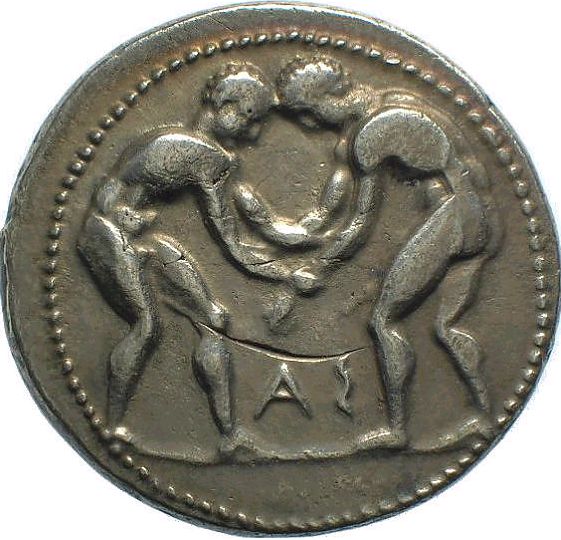
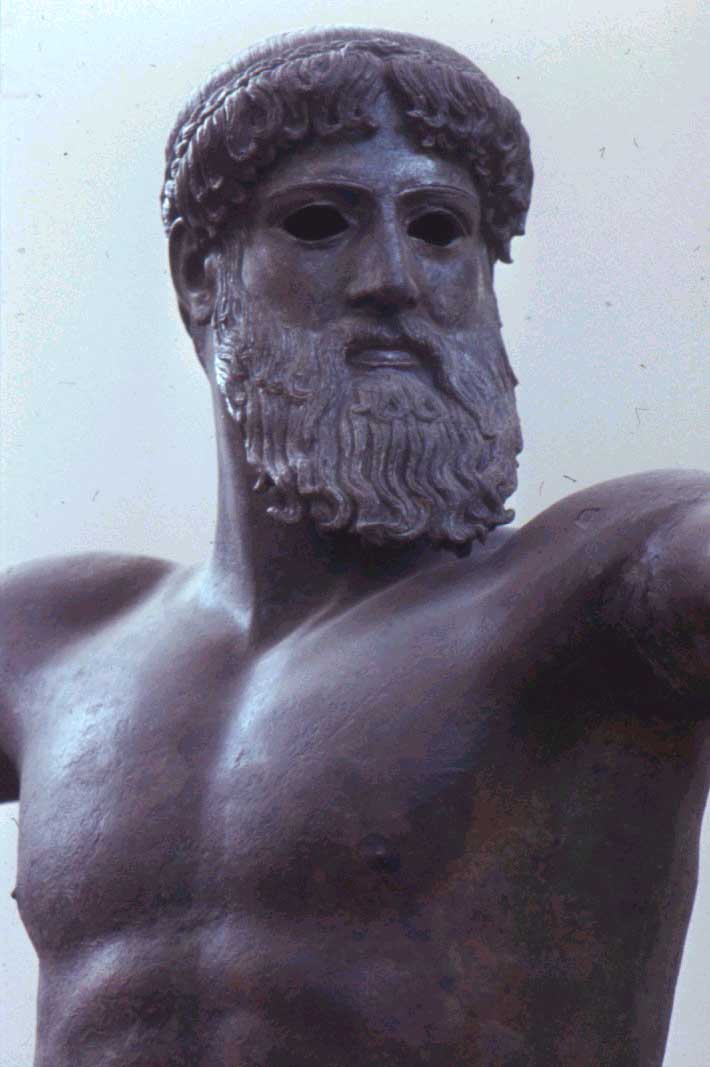
Zeus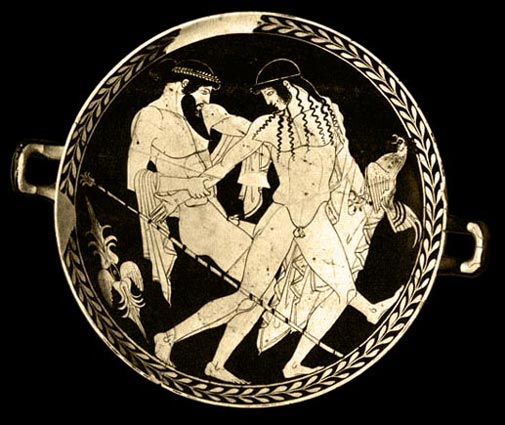
Zeus and Ganymedes
The name "Ganymedes" translates as "Rejoicing in Male Genitals"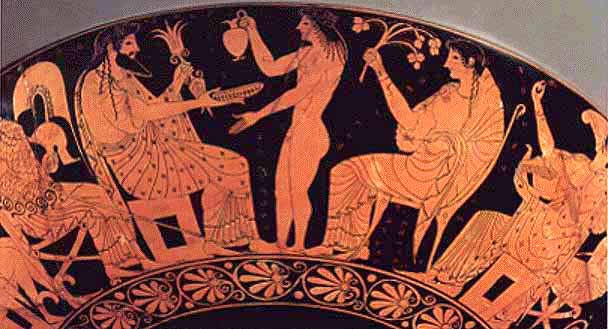
Zeus and his wife Hera on Olympos
Ganymedes stands between them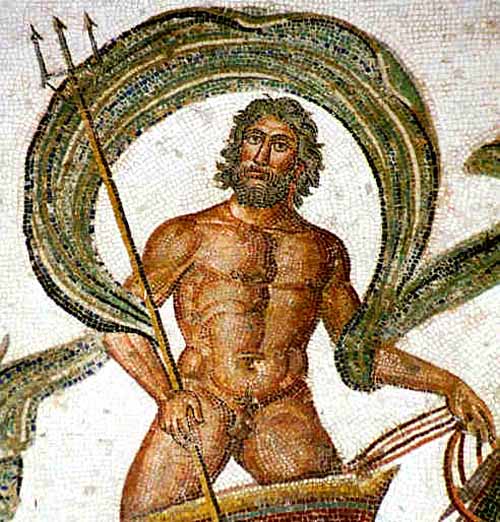
Poseidon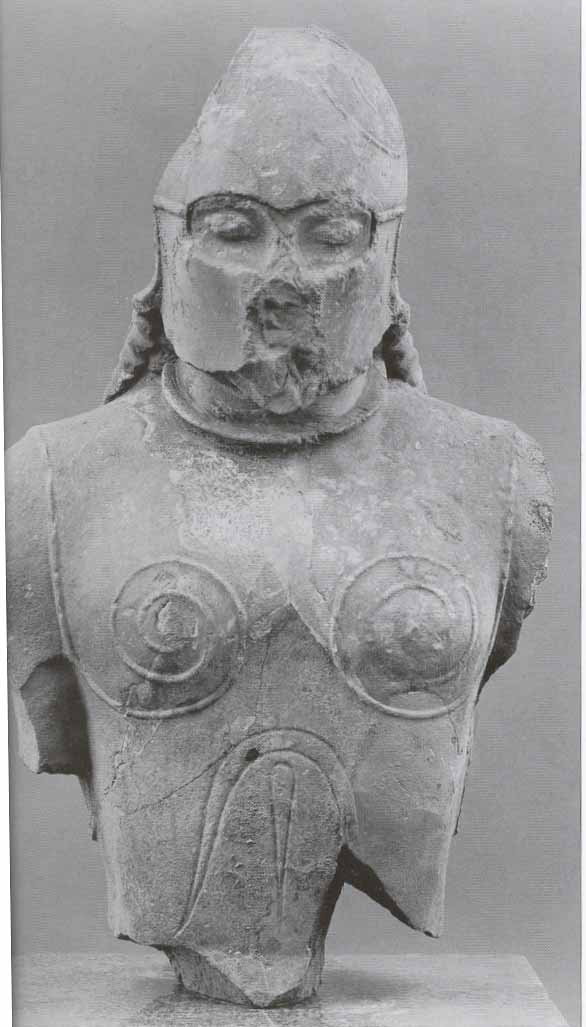
Pelops
The Hero wears the muscle cuirass and braided hair characteristic of Lakonian Warriors
the colony of brave men founded by Lydian Pelops, with whom mighty Earthholder Poseidon fell in love

Pelops -- beardless, nude, and to the viewer's left -- prior to the chariot race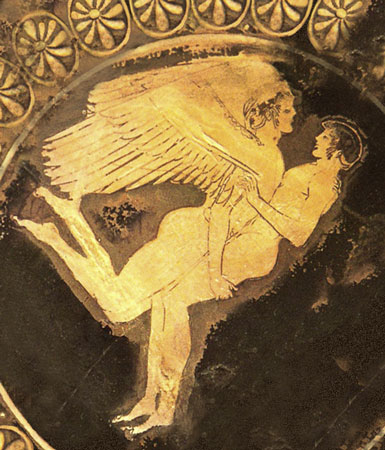
Hyakinthos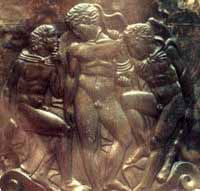
Iolaos and Herakles
The God Eros stands between them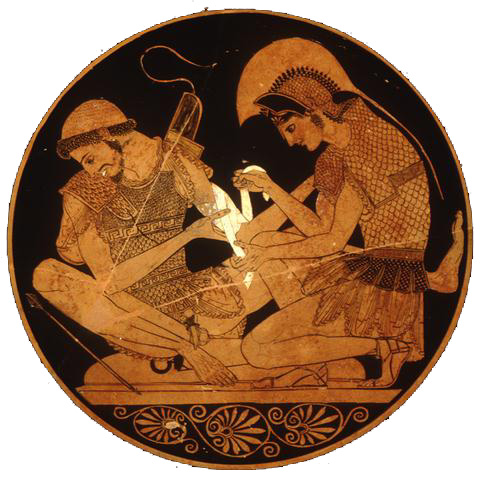
Achilles bandages his Lover Patroklos' arm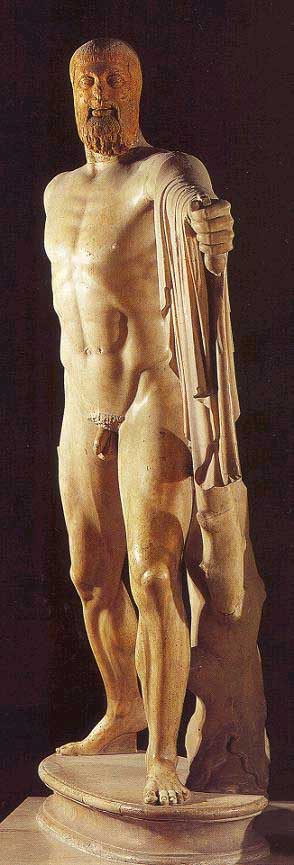

Aristogeiton and Harmodius
[T]he daring action of Aristogiton and Harmodius was undertaken in consequence of a love affair. . . . Harmodius was then in the flower of youthful beauty, and Aristogiton, a citizen in the middle rank of life, was his lover and possessed him. Solicited without success by Hipparchus, son of [the tyrant] Pisistratus, Harmodius told Aristogiton, and the enraged lover, afraid that the powerful Hipparchus might take Harmodius by force, immediately formed a design, such as his condition in life permitted, for overthrowing the tyranny.
to hold fast, . . . to grip one by the middle, of wrestlers
![]()
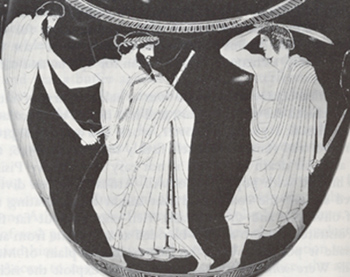
Aristogeiton and Harmodius slay Hipparchus
It is not to be wondered at that the people took such thought for families in the city, since on learning that the granddaughter of Aristogeiton was living humbly in Lemnos, unmarried because of her poverty, they brought her back to Athens, consorted her with a well-born man, and gave her the estate in Potamus for her dowry. For such humanity and benevolence, of which the city still gives illustrious examples even in my own day, she is justly admired and lauded.

Iolaos and Herakles
The God Eros stands between them
Early Greek society soon acquired distinctive features and institutions, which continued to be important in classical times and later. Among these were athletics and religiously based athletic events like the Olympian games; the gymnasium, which provided training for both athletics and its elder brother, warfare; the symposium [or all-male mess], at which aristocratic values were inculcated; and homosexuality, which was related to all the other phenomena just mentioned.
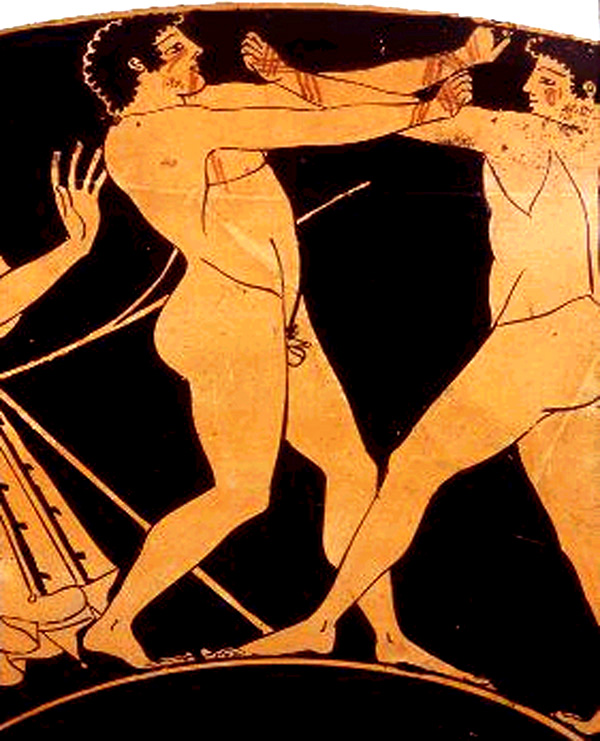
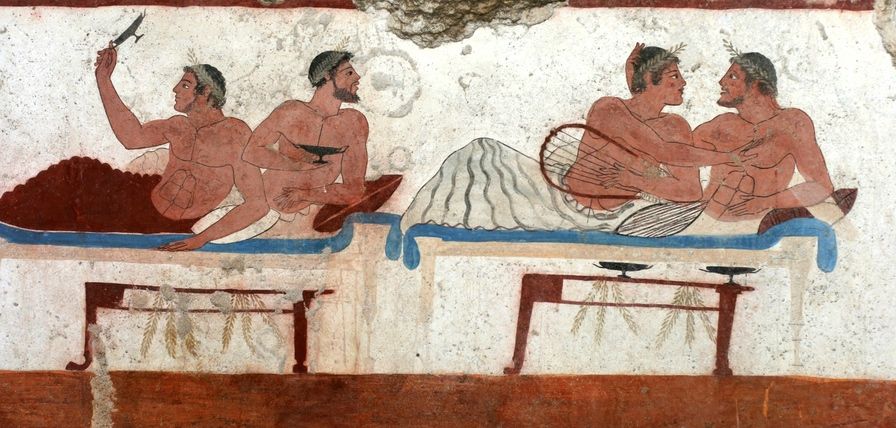
Each Spartan youth had an adult lover, called a "guardian," who was responsible for his conduct. According to Xenophon (Lak. Pol. 2. 13), engaged in a work of praise for the Lakedaimonian constitution, such connections were banned if they were formed on a purely physical basis, however he does not expect his reader to believe him. There can be little doubt that pederasty was common, and that a large percentage of the adult male population were practising homosexuals. The state could not tolerate bachelorhood, however, as its military manpower had to be maintained, and if citizens did not marry by a certain age, they were publically humiliated. Thus we find King Agesilaos happily married yet an ardent admirer of boys. Bisexuality of this type was quite widespread in many ancient Greek states.
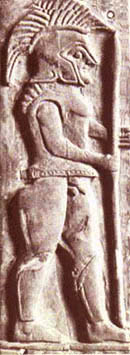 12345678910
12345678910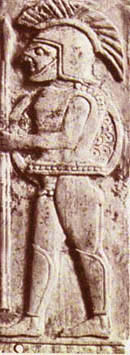
Spartan Hoplites
Harmodius
Aristogeiton and Harmodius slay Hipparchusa most beautiful young man in the flower of his youth

Harmodius
He was of conspicuous beauty and stature, and at an age when the human flower has the greatest charm, as the boy merges into the man. Naked as he was, without either defensive armour or clothing, -- for he had just anointed his body with oil -- he took a spear in one hand, and a sword in the other, leaped forth from his house, and after pushing his way through the midst of the combatants, ranged up and down among the enemy, smiting and laying low all who encountered him.
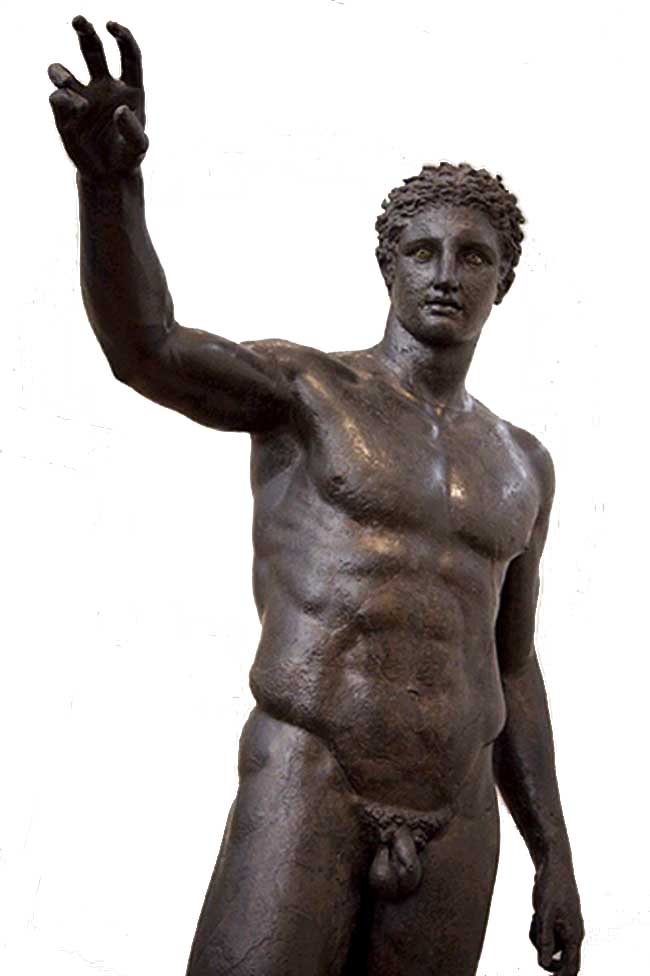
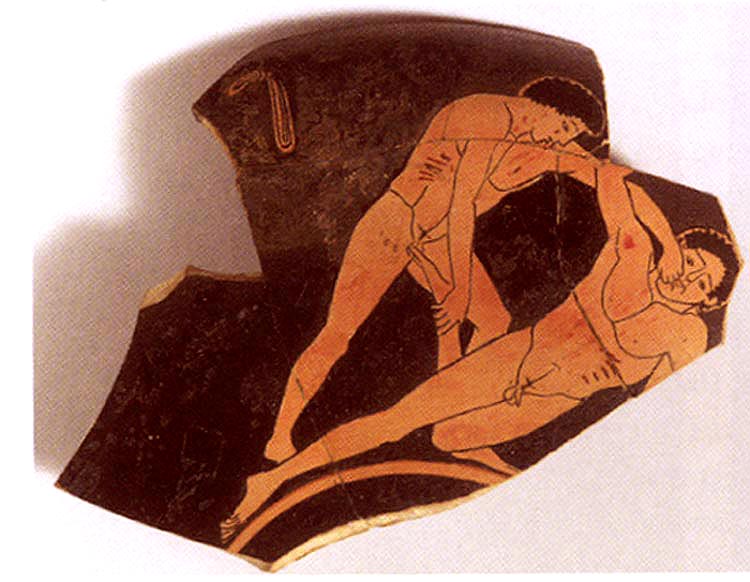
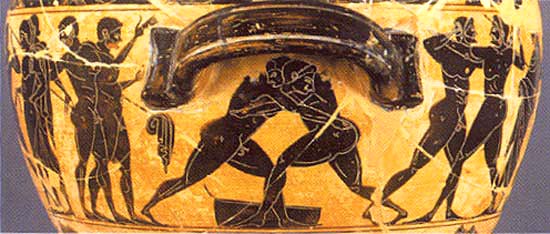
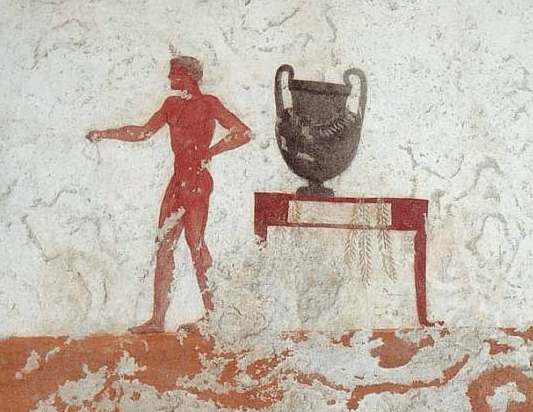
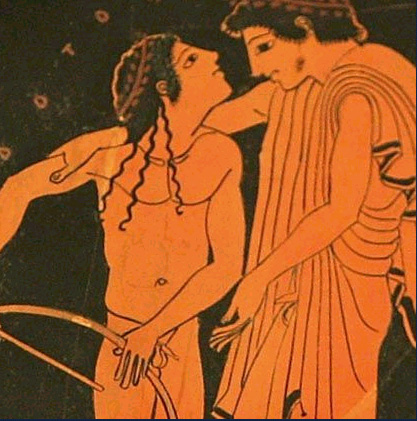
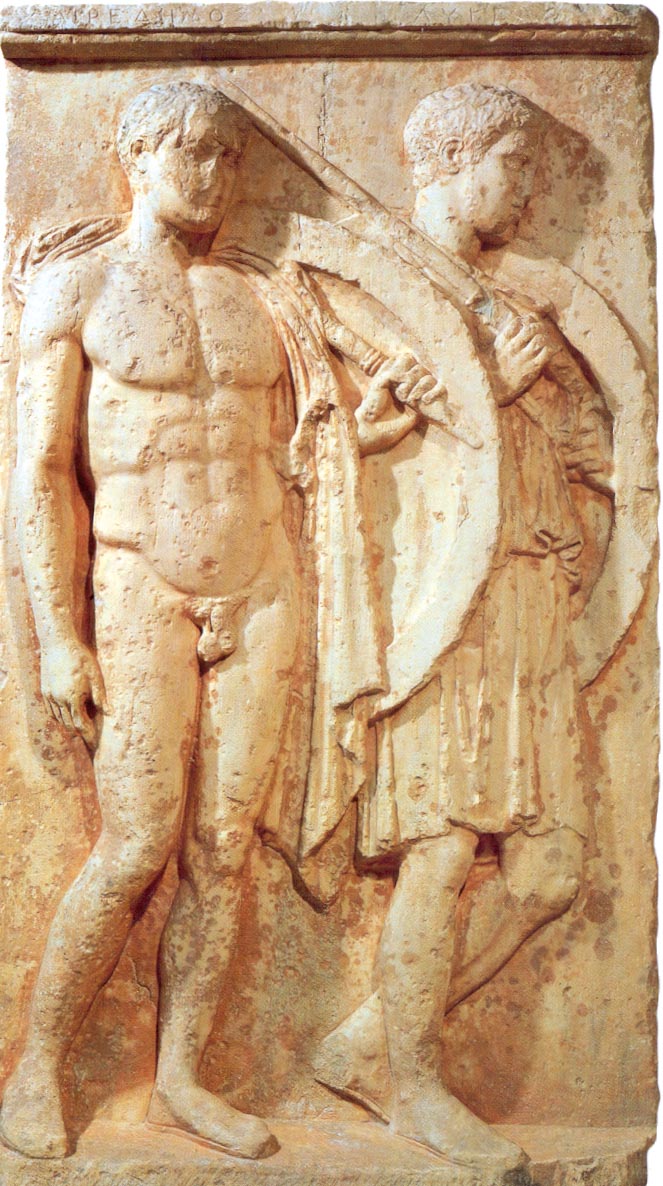
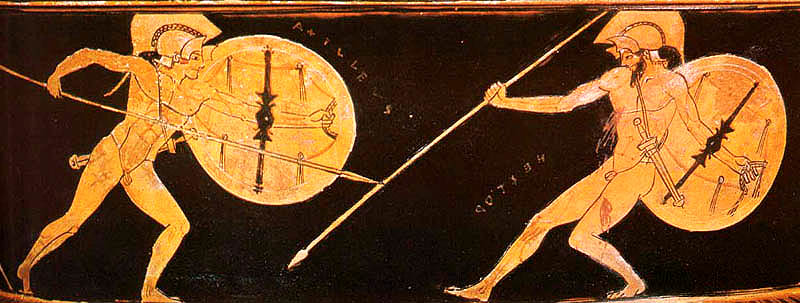
[Some scientists] adopt the idea of the homosexual as a physical "species" different from the heterosexual. But there are no convincing historical grounds for this view. As Foucault points out, at the time of Plato,
People did not have the notion of two distinct appetites allotted to different individuals or at odds with each other in the same soul; rather, they saw two ways of enjoying one's pleasure...
Biological determinism is misconceived intellectually, as well as politically loathsome . . . Contrary to today's bio-belief, the heterosexual/homosexual binary is not in nature, but is socially constructed, therefore deconstructable.
We should be calling humans bisexual because this idea of exclusive homosexuality is not accurate of people. Homosexuality is mixed in with heterosexuality across cultures and history.
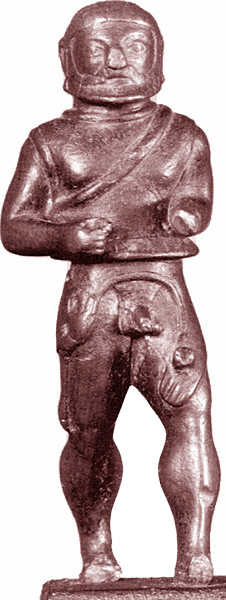
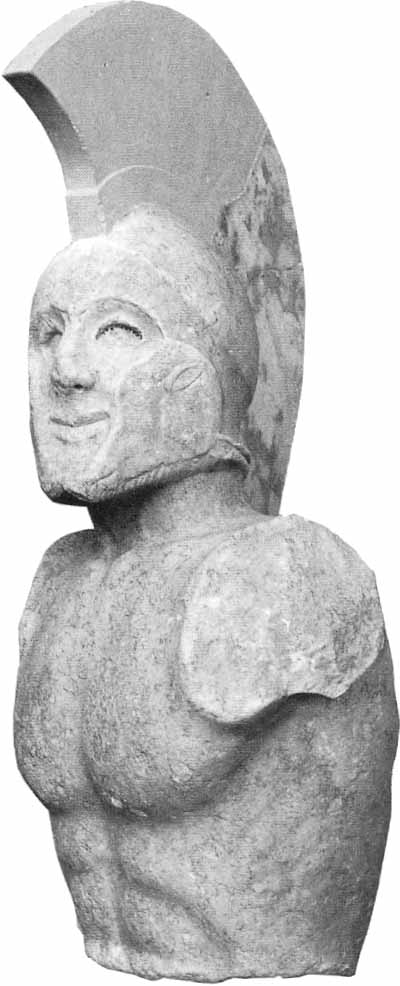
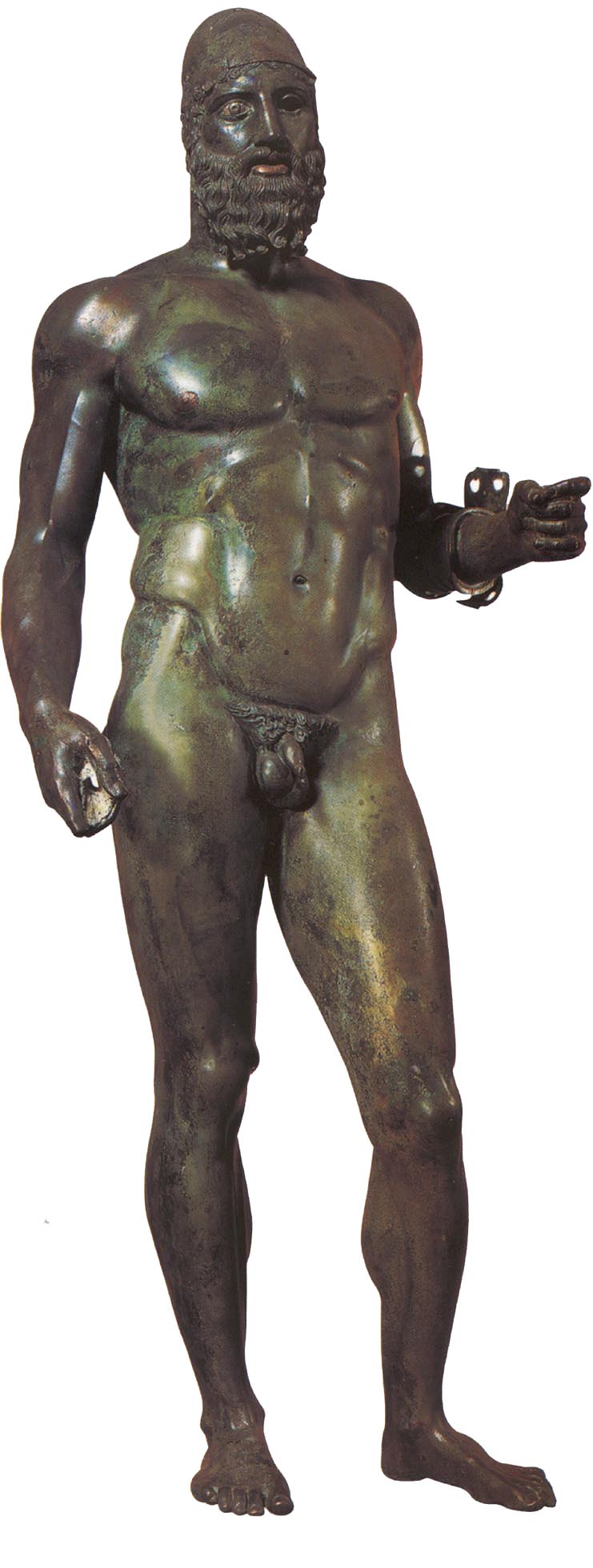
The daring action of Aristogiton and Harmodius was undertaken in consequence of a love affair.










who reject anal penetration, promiscuity, and effeminacy
among men who have sex with men







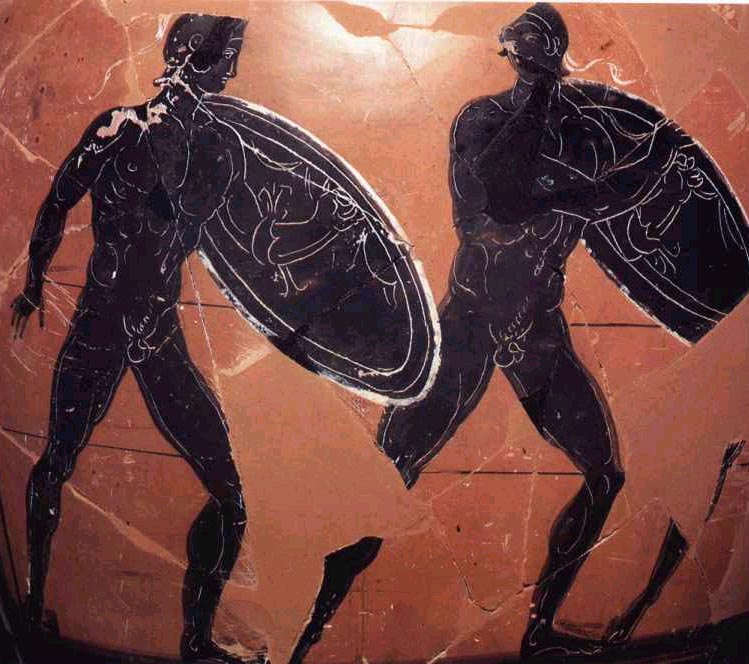
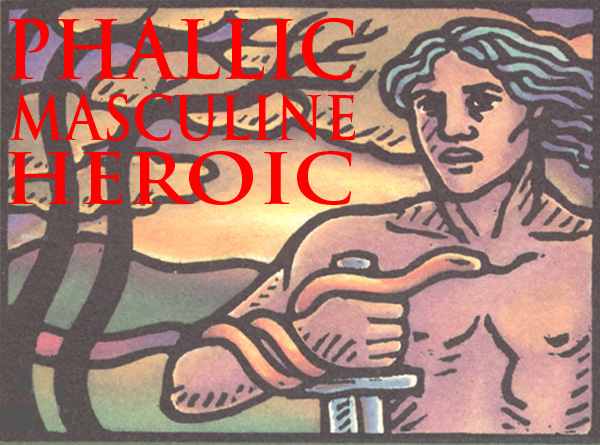






| Heroes Site Guide | Toward a New Concept of M2M | What Sex Is | In Search of an Heroic Friend | Masculinity and Spirit |
| Jocks and Cocks |
Gilgamesh | The Greeks | Hoplites! | The Warrior Bond | Nude Combat | Phallic, Masculine, Heroic | Reading |
| Heroic Homosex Home | Cockrub Warriors Home | Heroes Home | Story of Bill and Brett Home | Frot Club Home |
| Definitions | FAQs | Join Us | Contact Us | Tell Your Story |













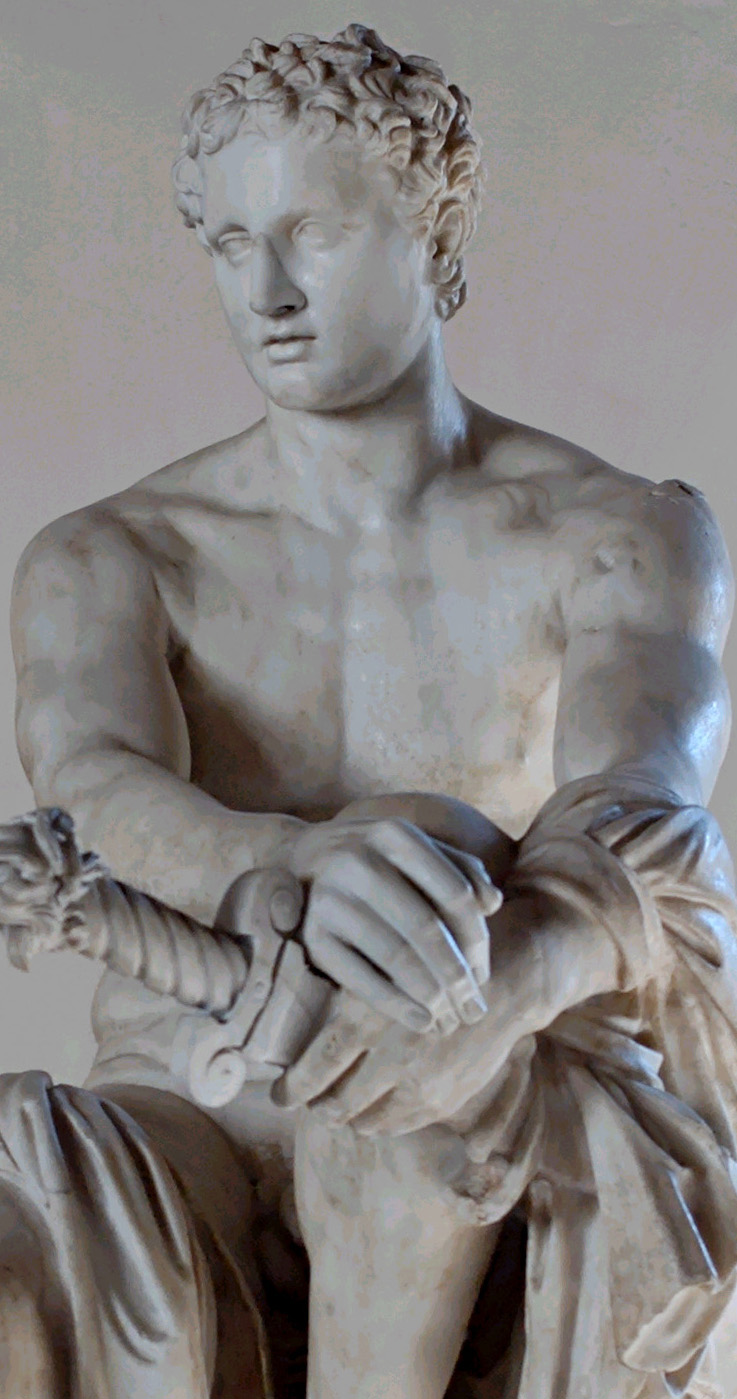

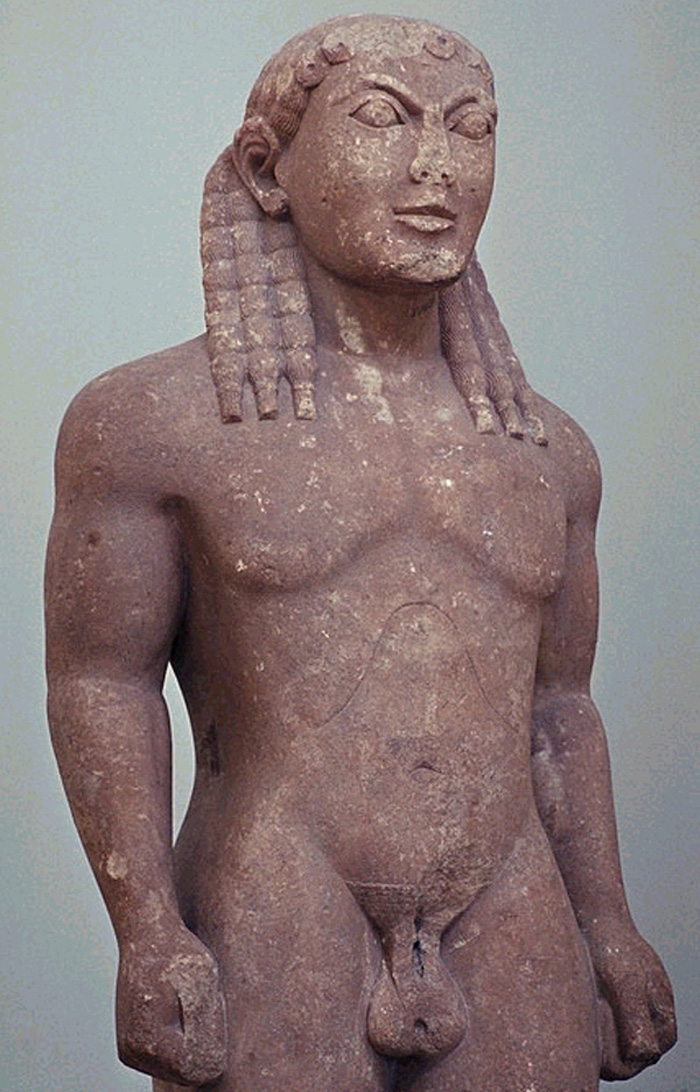

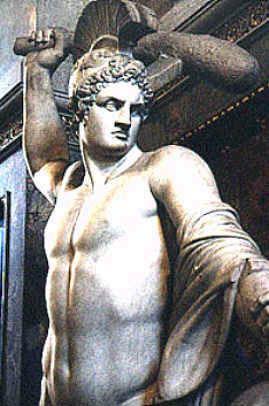


































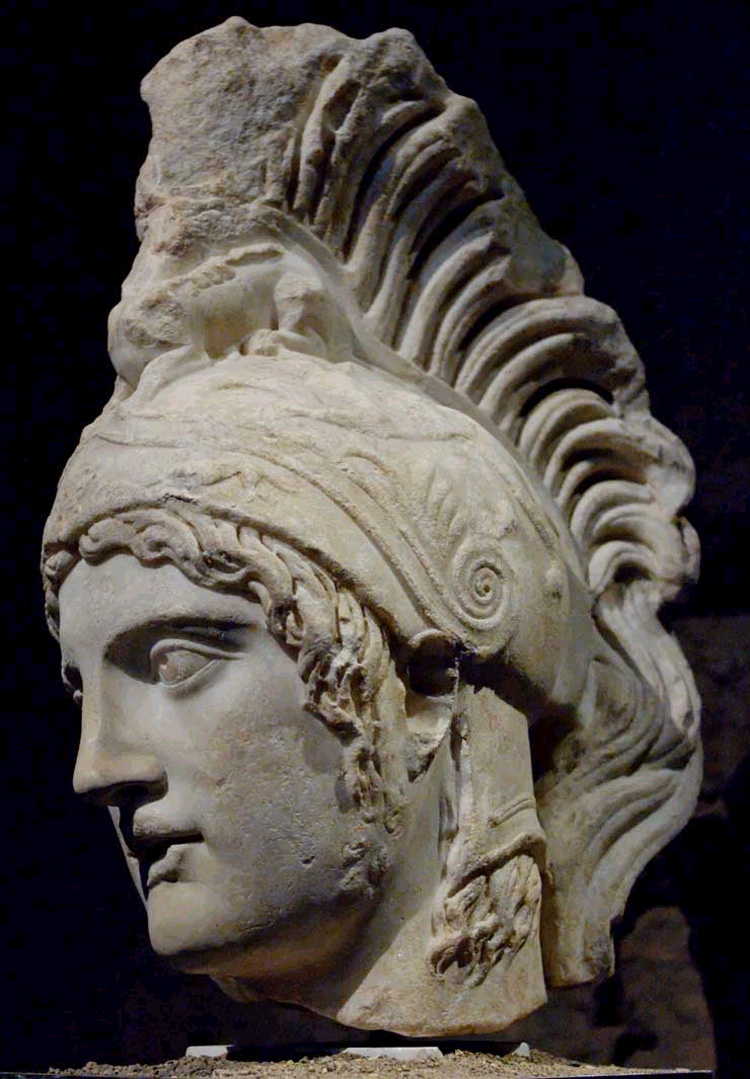


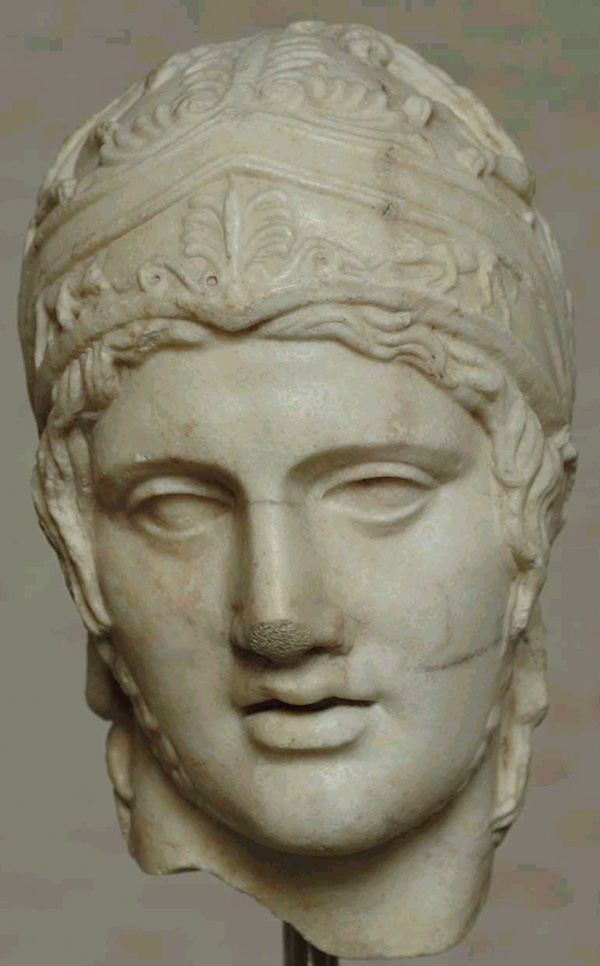

















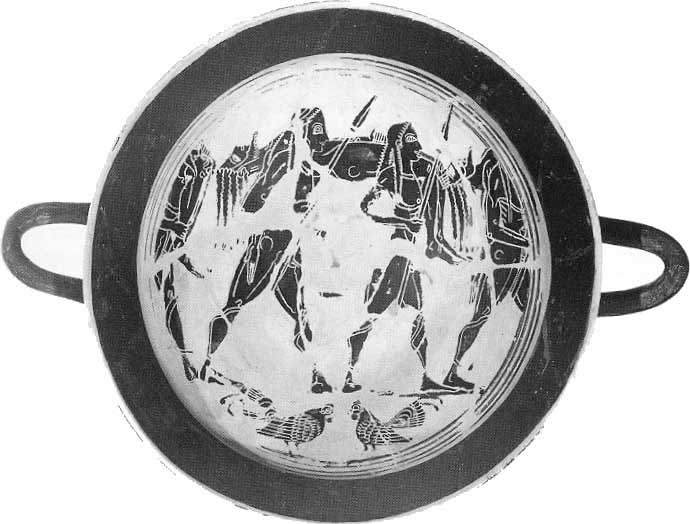



































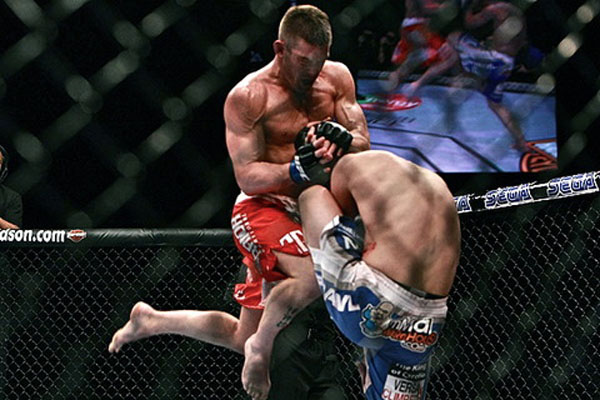

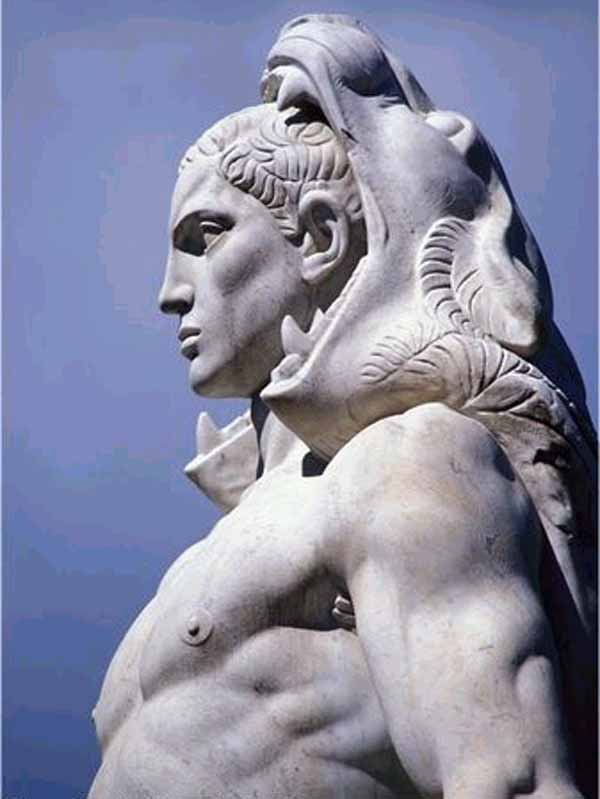
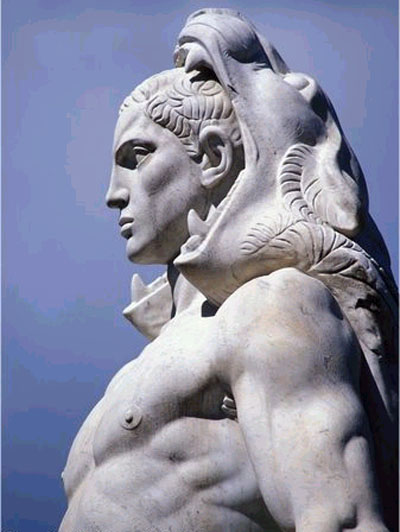
If an army went into battle without proper training and organisation they would lose. Historic example, in the English Civil War (1642 to 1646) the army of King Charles 1st was better organised and won most of the first battles; however Oliver Cromwell trained and organised the men fighting on Parliament's side into the New Model Army, and they won! If they had not been so organised the King would have carried on as the dictator he had been. Maybe eventually we would have got the freedoms that we enjoy now but it would have come more slowly and the monarch would have given them very grudgingly; so organisation is as you say vital to winning.




